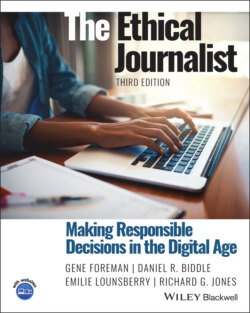Читать книгу The Ethical Journalist - Gene Foreman - Страница 58
Lessons from the battlefield
ОглавлениеThe experience of journalists who cover wars is also instructive because the violence and danger define the intervention question in stark terms. Most of the reporters and photographers who covered the combat in Iraq in 2003 were “embedded” with American military units. The Defense Department guidelines on embedding stated, “Embedded media operate as a part of their assigned unit,” and required that, for security reasons, the journalists agree in advance to ground rules placing restrictions on their ability to report.22 Journalists’ alternative to embedding was to work as “unilaterals” – on their own – and that was far more dangerous.
The embedded journalists often bonded with the soldiers and, more important, depended on them for protection when the shooting began. When soldiers in his unit sneaked off and got drunk, Jules Crittenden of the Boston Herald reassured their sergeant: “Don’t sweat it. That didn’t happen.” Later he reconsidered, and went back to the sergeant to let him know of his change of heart and get his agreement to let the story be told.23
Crittenden explained afterward why he had initially told the sergeant he would not write about the incident: “I didn’t intend to ruin my relationship with the unit and its leadership on the first night … by humiliating them in the international press over a disciplinary issue.” As for why he changed his mind, he said:
I witnessed the discipline being meted out – a remarkably open handling of sensitive personnel matters that would have never happened in the civilian world. … My story in the Herald was not about a soldier getting drunk, but about the platoon sergeant’s leadership in a period immediately prior to hostilities. I took the unusual step of seeking [the sergeant’s] permission and gave him the courtesy of a veto because I had made a commitment to him, and it was important for him to understand in our ongoing relationship under difficult circumstances that I could be expected to do what I said I was going to do.24
On another occasion, Crittenden gave the unit the location of Iraqi military positions he had spotted. In the resulting firefight, three enemy soldiers were killed. Shortly afterward, he wrote: “I’m sure there are some people who will question my ethics, my objectivity, and so forth. I’ll keep the argument short. Screw them, they weren’t there.”25
Meg Laughlin, a Knight Ridder reporter, took a different view of her role as a noncombatant. When she was offered an M16 rifle and asked to take a place in her unit’s perimeter defense, she declined. “Are you crazy?” she asked. “We’re all in trouble if you’re depending on me to guard you.”26 Crittenden said he did pick up a rifle once when the enemy ambushed the unit he was accompanying, but he intended to use it only for self‐defense and put it down without firing.
Crittenden disputes any assumption that embedded reporters are “automatically influenced” by the security provided by the soldiers. “Reporters in war zones typically operate on goodwill and good sense,” he said, and they “…share whatever security is enjoyed by whichever group they happen to be with.” He acknowledged that “eating, sleeping, and enduring hardship with generally likeable and well‐behaved young men day in and day out creates personal relationships.”27
For Crittenden, the context of the war itself is relevant in a discussion of American journalists’ conduct. He said:
We were riding with the United States Army as it was engaged in removing a dangerous, murderous despot and his forces. Any question of objectivity and balance has to be objectively balanced against those facts. Applying any kind of moral equivalence to the United States Army and the Iraqi Republican Guard or the Saddam Fedayeen in that situation would be immoral. 28
In his gripping account of the US Army’s capture of Baghdad, author David Zucchino told how reporter Ron Martz of The Atlanta Journal‐Constitution helped a medic administer aid to two soldiers gravely wounded in an armored personnel carrier as they drove into the capital. His was a humane intervention, even though the soldiers were actors in the drama he was covering.29 “Once we crawl inside the Abrams tank and trundle our way to Baghdad with the boys, we should not kid ourselves about ‘objectivity,’” Julie McCarthy of National Public Radio said.30
